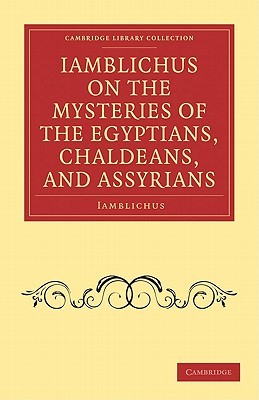
- We will send in 10–14 business days.
- Author: Iamblichus
- Publisher: Cambridge University Press
- ISBN-10: 1108073042
- ISBN-13: 9781108073042
- Format: 14 x 21.6 x 2.2 cm, minkšti viršeliai
- Language: English
- SAVE -10% with code: EXTRA
Iamblichus on the Mysteries of the Egyptians, Chaldeans, and Assyrians (e-book) (used book) | bookbook.eu
Reviews
Description
This translation from the Greek by Thomas Taylor (1758-1835) was first published in 1821. Taylor's early writings and translations into English influenced such romantic poets as Blake, Coleridge and Keats. Iamblichus is thought to have been born in Syria in the middle of the third century and is regarded as one of the great Neoplatonist philosophers. He founded a school in which he taught 'white magic' or 'theurgy'; he sought to uncover the invisible side of nature and to give Man the means to effect the union of the divine spark with its parent-flame within him. In this work, divided into ten sections, he gives a complete canon of pagan religious thought and belief and explains their background. The Neoplatonist Porphyry's Letter to Anebo, in which he criticises religious rituals and practices, and Iamblichus' response to this criticism, and defence of these traditions, are included.
EXTRA 10 % discount with code: EXTRA
The promotion ends in 23d.02:55:05
The discount code is valid when purchasing from 10 €. Discounts do not stack.
- Author: Iamblichus
- Publisher: Cambridge University Press
- ISBN-10: 1108073042
- ISBN-13: 9781108073042
- Format: 14 x 21.6 x 2.2 cm, minkšti viršeliai
- Language: English English
This translation from the Greek by Thomas Taylor (1758-1835) was first published in 1821. Taylor's early writings and translations into English influenced such romantic poets as Blake, Coleridge and Keats. Iamblichus is thought to have been born in Syria in the middle of the third century and is regarded as one of the great Neoplatonist philosophers. He founded a school in which he taught 'white magic' or 'theurgy'; he sought to uncover the invisible side of nature and to give Man the means to effect the union of the divine spark with its parent-flame within him. In this work, divided into ten sections, he gives a complete canon of pagan religious thought and belief and explains their background. The Neoplatonist Porphyry's Letter to Anebo, in which he criticises religious rituals and practices, and Iamblichus' response to this criticism, and defence of these traditions, are included.


Reviews